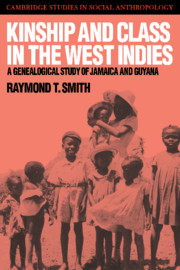Book contents
- Frontmatter
- Contents
- Preface
- Maps
- 1 Introduction: assumptions, procedures, methods
- 2 Kinship, culture and theory
- 3 What is kinship in the West Indies?
- 4 The structure of genealogies
- 5 Marriage in the formation of west Indian society
- 6 Modern marriage and other arrangements
- 7 Sex role differentiation
- 8 Household and family
- 9 Conclusion
- References
- Index
- Cambridge Studies in Social Anthropology
- Frontmatter
- Contents
- Preface
- Maps
- 1 Introduction: assumptions, procedures, methods
- 2 Kinship, culture and theory
- 3 What is kinship in the West Indies?
- 4 The structure of genealogies
- 5 Marriage in the formation of west Indian society
- 6 Modern marriage and other arrangements
- 7 Sex role differentiation
- 8 Household and family
- 9 Conclusion
- References
- Index
- Cambridge Studies in Social Anthropology
Summary
Let every female live perfectly uncontrolled by any man, and enjoying every freedom, which the males only have hitherto enjoyed; let her choose and change her lover as she please, and of whatever rank he may be. At her decease, let her possessions be divided among her children.
Every child might remain with the mother, who might superintend its education. The daughters, arrived at maturity, might follow their inclinations with so little restraint as their brothers, who might quarter themselves on the daughters of other families.
Though both sexes are equal, their employments may be different… Man is designed for active, woman for domestic life. Let males be their own masters, and employ themselves in public affairs; let the females be their own mistresses, and manage their own domestic concerns.
James Henry Lawrence 1976 [1811]What are the implications for general theory of the data presented in the preceding chapters?
The supposed ‘problems’ that have dominated the literature on Caribbean kinship (and much of that on kinship generally), were generated in the social practice of colonial social systems. The Caribbean is a particularly useful area in which to study these processes.
- Type
- Chapter
- Information
- Kinship and Class in the West IndiesA Genealogical Study of Jamaica and Guyana, pp. 177 - 184Publisher: Cambridge University PressPrint publication year: 1988



